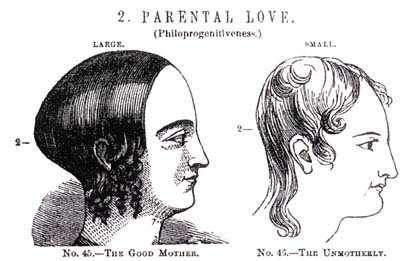The Lost Museum Archive
Illustration & Explanation of "Parental Love"
The pre-eminent spokesmen for phrenology, Orson and Lorenzo Fowler operated a publishing house, mail-order business, and museum of human and animal skulls. They zealously promoted phrenology as a practical tool for self-improvement. This excerpt from their book New Illustrated Self-Instructor in Phrenology and Physiology illustrates their accessible, if simplistic, approach to understanding and altering character traits.

Parental Love
(Philoprogenitiveness)
Attachment to one's own offspring; love of children, pets, and animals generally, especially those young or small; adapted to that infantile condition in which man enters the world, and to children's need of parental care and education. This faculty renders children the richest treasure of their parents, casts into the shade all the toil and expense they cause, and lacerated them with bitter pangs when death or distance tears them asunder. It is much larger in woman than in man; and nature requires mothers to take the principal care of infants. Perverted, it spoils children by excessive indulgence, pampering, and humoring.
VERY LARGE -- Experience the parental feeling with the greatest possible intensity and power; almost idolize their own children, grieve immeasurably over their loss, and, with large Continuity, refuse to be comforted; with very large Benevolence, and only moderate Destructiveness, can not bear to see them punished, and with only moderate Causality, are liable to spoil them by over-indulgence; with large Approbativeness added, indulge parental vanity and conceit; with large Cautiousness and disordered nerves, are always cautioning them, and feel a world of groundless apprehensions about them; with Acquisitiveness moderate, make them many presents, and lavish money upon them; but with large Acquisitiveness, lay up fortunes for them; with large moral and intellectual organs, are indulged, yet love them too well to spoil them, and so their utmost to cultivate their higher faculties, etc.
LARGE -- Love their own children devotedly; value them above all price; cheerfully endure toil and watching for their sake; forbear with their faults; win their love; delight to play with them, and cheerfully sacrifice to promote their interests; with Continuity large, mourn long and incessantly over their loss; with Combativeness, Destructiveness, and Self-esteem large, are kind, yet insist on being obeyed; with Self-esteem and Destructiveness moderate, are familiar with, and liable to be ruled by them; with Firmness only average, fail to manage them with a steady hand; with Cautiousness large, suffer extreme anxiety if they are sick or in danger; with large moral and intellectual organs, and less Combativeness and Destructiveness, govern them more by moral suasion than physical force -- by reason than fear; are neither too strict nor over-indulgent; with Approbativeness large, value their moral character as of the utmost importance; with Veneration and Conscientiousness large, are particularly interested in their moral improvement; with large excitability, Combativeness, and Destructiveness, and only average Firmness, will be by turns too indulgent, and over-provoked -- will pet them one minute, but punish them the next; with larger Approbativeness and Ideality than intellect, will educate them more for show than usefulness -- more fashionably than substantively -- and dress them off in the extreme of fashion; with a large and active brain, large moral and intellectual faculties, and Firmness, and only full Combativeness, Destructiveness, and Self-esteem, are well calculated to teach and manage the young. It renders farmers fond of stock, dogs, etc., and women fond of birds, lap-dogs, etc.; girls fond of dolls, and boys of being among horses and cattle; and creates a general interest in young and small animals.
FULL -- Love their own children well, yet not passionately -- do much for them, yet not more than necessary -- and with large Combativeness, Destructiveness, and Self-esteem, are too severe, and make too little allowance for their faults; but with Benevolence, Adhesiveness, and Conscientiousness large, do and sacrifice much to supply their wants and render them happy. Its character, however, will mainly be determined by its combinations.
AVERAGE --Love their own children tolerably well, yet care but little for those of others; with large Adhesiveness and Benevolence, like them better as they grow older, yet do and care little for infants; are not duly tender to them, or forbearing toward their faults, and should cultivate parental fondness, especially if Combativeness, Destructiveness and Self-esteem are large.
MODERATE -- Are not fond enough of children; will not bear much from them; fail to please or take good care of them, particularly of infants; cannot endure to hear them cry, or make a noise, or disturb things; and with an excitable temperament, and large Combativeness, are liable to punish them for trifling offenses, find much fault with them, and be sometimes cruel; yet with Benevolence and Adhesiveness large, do what is necessary for their comfort.
SMALL -- Care little for their own children, and still less for those of others; and with Combativeness and Destructiveness large are liable to treat them unkindly and harshly, and are utterly unqualified to have charge of them.
VERY SMALL -- have little or no parental love or regard for children, but conduct toward them as the other faculties dictate.
TO CULTIVATE -- Play with and make much of children; try to appreciate their loveliness and innocence, and be patient and tender and indulgent toward them; and if you have no own children, adopt some, or provide something to pet and fondle.
TO RESTRAIN -- Set judgment over against affection; rear them intellectually' give yourself less anxiety about them, and if a child dies, by all means turn your mind from that loss by seeking some powerful diversion, and a change of associations, removing clothes and all remembrances, and keep from talking or thinking about them.
Source: From: New Illustrated Self-Instructor in Phrenology and Physiology with over One Hundred Engravings by O.S. and L. N. Fowler, 1859.